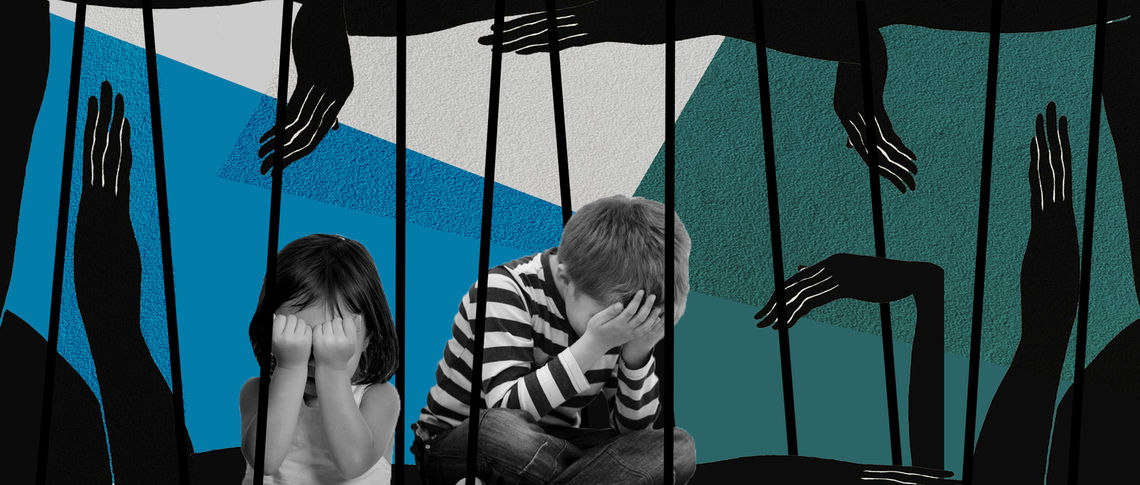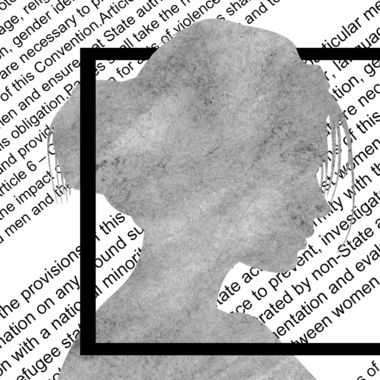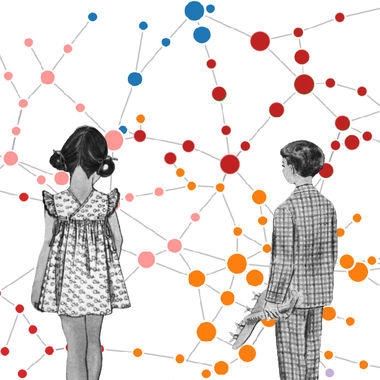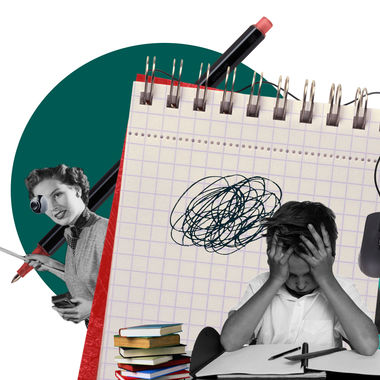
A few days ago, a man in Yerevan committed suicide by jumping out of his ninth-storey apartment. But he wasn’t alone. According to police reports, he first threw his eight-year-old son out the window and then picked up his five-year-old daughter and jumped. Their bodies were discovered early in the morning by a woman on her way to work at a bakery.
The tragedy sent shockwaves across the country. No one knows what triggered the double murder-suicide. As reporters and camera crews rushed to the scene, neighbors, hunched over in quiet disbelief, said he seemed like an upstanding man, had a job, played with his children in the courtyard.
Whether this heart-wrenching tragedy had anything to do with the state of emergency, the enforced self-isolation or the economic fallout because of the COVID-19 pandemic is hard to say. What is obvious is that the most vulnerable in society—children—are paying a heavy price.
According to UNICEF, 91 percent of the world’s student population have seen their education interrupted because of nationwide or localized school closures. The repercussions of this unprecedented global crisis will be felt for years, if not generations.
While education is the most visible issue, the impact on children cuts much deeper than is being recognized. “Children are the hidden victims of this major crisis,” says Tanja Radocaj, UNICEF’s Representative in Armenia. “With the focus [of countries] being on acquiring protective equipment (PPE), ventilators, on the numbers, who is to blame, the effect it’s having on children is being seriously undermined.”
After the World Health Organization (WHO) declared COVID-19 a global pandemic, countries declared states of emergency and went into lockdown; one of the first measures was to shut down schools. In order not to disrupt the academic process, many countries transitioned to distance learning, often unprepared, often with little experience. Radocaj acknowledges that one of the obvious problems was the lack of access to connectivity and devices; however, this was not the only concern. “Not all children have parents who can support them in homeschooling,” she says adding that the longer children stay out of school, the bigger the number will be of those children who will not go back to school.
In Armenia, around 20 percent of children are not actively participating in distance learning, mostly because of a lack of devices but also because of conditions in the home, says Radocaj.
UNICEF is currently working with Armenia’s Ministry of Education, Science, Sport and Culture to prepare schools for reopening, whenever that time comes. This does not only mean sanitizing schools to ensure children are not infecting each other and bring the virus home to more at-risk adults. The other aspect is to make sure children have the opportunity to catch up on what they missed. According to Radocaj, the Ministry’s initial response to transition to distance learning was quick and as comprehensive as possible, but still, it was an improvised response. “We need to now assess the impact and the consequences and see how to deal with the consequences,” she says. “Even if those children are nominally participating [in distance education], the question is how many of them benefitted, especially the younger children for whom learning online isn't a viable option.”
Healthcare and Access to Vaccines
Education aside, a misconception has been that COVID-19’s impact on the health of children is minimal. “But there are children that are getting infected and seriously affected and we cannot underestimate this,” Radocaj says, adding that both health professionals and parents don’t know how to act in this situation. Reports are coming in from different parts of the world about how COVID-19 is potentially impacting the health of children. According to an article published in the New York Times, a number of children infected with COVID-19 have recently been hospitalized with a “mysterious syndrome that doctors do not yet fully understand but that has also been reported in several European countries…” These children are showing symptoms associated with Kawasaki disease - inflammation of the blood vessels, including coronary arteries.
But children are always in need of medical attention outside of COVID-19. “Parents don’t seek help for other medical reasons, and even if they seek help, it’s not clear if they will get it.They don’t know what is the right way to do it,” Radocaj says.
Another serious issue raising alarms across the world, is that children are dropping out of regular vaccination programs. “Part of the problem is that health systems are not getting organized,” Radocaj says. “Part of it, unfortunately, is that while we are all hoping for a new vaccine, all the rumours about how bad vaccines can be are more lively than ever and parents are more confused than ever.”
Compounding these problems is that almost all global transportation routes are shut down and as such have made it extremely difficult to distribute vaccines to countries and regions where it is needed. “We, normally, as UNICEF are able to tap into our global supply division for emergencies and they usually deliver within days, for all kinds of emergencies that happen in the world,” Radocaj explains. “Because this is a new kind of emergency, all countries and the whole world is after the same items and the most powerful countries are sparing no money to buy them.”
UN Secretary-General Antonio Guterres issued a statement on April 16, calling on countries to prioritize children’s safety amid the COVID-19 pandemic. Highlighting a number of issues children are facing, a passage from that statement reads: “Polio vaccination campaigns have been suspended. Measles immunization campaigns have stopped in at least 23 countries. And as health services become overwhelmed, sick children are less able to access care. With the global recession gathering pace, there could be hundreds of thousands additional child deaths in 2020.”
Deepening Poverty and Violence
Children who are living in poverty or in dysfunctional families will be especially hard hit. They are at much higher risk of being pushed further into poverty. Families that are dependent on low-paid or unstable work have very little to fall back on. Few of them have any savings; on the contrary, they are mostly in debt and can’t afford proper nutrition or care for their children. Loss of income means missing meals, making it impossible for these families to comply with regulations or health advice.
The lockdown is also exacerbating violence in the home. Many countries are reporting higher incidents of domestic abuse under these conditions. Families, stuck in confined spaces with seemingly insurmountable challenges, are taking their frustration out on the most vulnerable.
“Some countries that looked at this phenomenon have seen an increase of domestic violence, violence against children,” Radocaj says. “We do know, because we are in touch with colleagues - social workers, psychologists - that there are registered cases [in Armenia] but they are certainly the tip of the iceberg; the system is not set up for children or women or the elderly to report or get help and if they don’t know where to go or if they will be helped, they don’t seek help.”
Mental Health
The pandemic has precipitated widespread fear, concern and anxiety. People are exposed to it through mass media, social media, the 24-hour news cycle. Families are not only worried about the virus, but about the future, the loss of income and security. Children feel this fear and anxiety and many are already beginning to display symptoms. Societies need to understand how to deal with these things. In Armenia, unfortunately, taking care of mental health has never been a priority. “We are still living and working in a reality where children are likely to be punished for acting out or being disobedient or expressing their feelings in a way that adults might not feel is appropriate,” Radocaj says. “A lot of public education has to happen in order not to create more damage to children.”
While younger children may be more resilient and can bounce back better than adolescents, much of this is dependent on the stability and safety of their families. Children from vulnerable socioeconomic families who are facing job loss, food and housing insecurity and general instability are pointedly more at risk and will require the greatest support - psychological, mental and academic.
Even in stable families, parents are having to confront what is developmentally appropriate for their children. There is conflicting advice, for example, on how much screen-time is appropriate for children. While it’s not clear if the amount of screen time has a negative impact, for many children, it’s a lifeline, it keeps them connected with the world, it gives them some sense of normalcy. “We maybe shouldn't be overly worried about it,” says Radocaj but acknowledges that a lot of parents don’t know about online violence, online bullying and older children may be in danger of being preyed on. “Parents are not well-equipped… and children may now be more exposed. So on the one hand, communicating is a good thing and children need communication and socialization. And on the other hand, there are risks,” explains Radocaj.
Moving Forward, Lessons to Be Learned
While the majority of countries are still trying to contain the transmission of COVID-19 and no one really knows how it will play out, it’s important to start seeing some of the very critical issues that have been laid bare. That means preparing for short- and long-term solutions. “Creating capacity for these two is not easy,” says Radocaj. “We are so preoccupied with the immediate response, counting, testing, prevention that we have already lost sense of other aspects of this crisis.”
For the long-term, Radocaj believes that the global community needs to seriously assess the different aspects of the impact this crisis has had on individuals, families, societies and nations. “This is a big dilemma for all countries, how do you prioritize? If we fail to recognize the impact on the young population, they will not be able to be productive in the near future. We cannot wait for the economy to pick up; it has to be done in parallel,” she says.
Parents Need Help, Too
Parents are responsible for ensuring the physical and mental health of their children, but they themselves are facing stress, anxiety and fear. Radocaj says the most important thing for parents is to stay as calm as possible, to not obsess about the academic achievements of their children. “It’s not easy,” Radocaj admits. “Parents also need support; their burden is huge, they are working from home, helping the children with homeschooling, some have lost their jobs and they worry about having food on the table for the next month.”
Struggling parents need support through public education, communication tools, the media, help lines, and professional advice. Parents with children who have special needs are especially at risk. “They are more isolated now even more because regular services are disrupted. There are no daycare centers to take their children at least part of the day,” Radocaj says. “These problems will not go away. We will continue having to live with this virus for a while, no miracle will make it disappear.”
also read
Breaking Intergenerational Violence Against Children in Armenia
By Lusine Sargsyan
UNICEF Armenia recently held a conference discussing child abuse in Armenia, a topic that is often not talked about. Based on the Demographic and Health Survey conducted in almost 8000 households in the country, the numbers of children experiencing physical and psychological abuse are quite alarming.
The Istanbul Convention Digested
By Avnik Melikian
Did Armenia’s government jump the gun by announcing that it will ratify the Istanbul Convention to an unprepared population? The Convention, the first international treaty that legally defines violence against women, has become a controversial topic in Armenia, dividing a deeply conservative society and creating panic, bordering on hysteria, in some circles.
The Irreversible Consequence of Indifference
By Gohar Abrahamyan
Journalist Gohar Abrahamyan stumbled upon a scuffle on one of the central streets of Yerevan involving an elderly man and his young grandson. While trying to understand the situation, Abrahamyan also uncovered the irreversible consequence of people’s indifference when they witness abuse.
COVID-19
“Children, Can You Hear Me?”
By Gohar Abrahamyan
Teachers, students and parents are all trying to cope with the transition to online education. Gohar Abrahamyan reveals some of the successes and challenges.
Distance Education in Times of Coronavirus
By Narek Manukyan
Educational institutions around the world are moving to online learning as the COVID-19 pandemic wreaks havoc. Narek Manukyan examines the Armenian education system’s preparedness for distance learning following the government’s announcement of a one-month state of emergency in the country.









EVN Report welcomes comments that contribute to a healthy discussion and spur an informed debate. All comments will be moderated, thereby any post that includes hate speech, profanity or personal attacks will not be published.